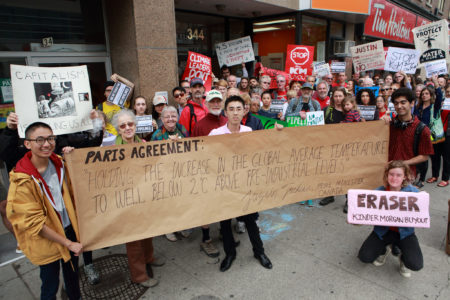It seems to be a feature of human psychology that arbitrary power over others corrodes virtue. That claim can be supported by highly artificial (and unscientific) situations like the Stanford prison experiment, but it’s also evident in day-to-day interactions. We may hope that an innate sense of fairness would be enough to usually stop people from pressing an undeserved advantage; failing that, people might be counted on to recognize that we tend to interact with the same people over and over, and reputation is important, so it’s in our interest not to exploit a unilateral advantage. And yet, when actually put in the situation where we can dictate terms to others, too often we use the power for selfish ends while pulling together a rationalizing story for ourselves about how what we’re doing is savvy, or fair, or even benevolent.
Perhaps the most extreme case of arbitrary power concerns decisions made today that affect future generations. I think Henry Shue’s moral analysis of climate change is among the most perceptive accounts of the problem:
The ones who need to worry about severe climate change are the most vulnerable, including children yet to be born, who may reap the whirlwind if we sow the wind. Those who will suffer most, if anyone does, will be people with absolutely no past role in causing the problem and with no other kind of responsibility for it (and other species, most with no capacity for morally responsible action but full capacity for suffering and frustration). This would put the wrong done by the avoidable precipitation of severe climate change, it seems to me, in the general moral category of the infliction of damage or the risk of damage on the innocent and the defenseless. This is far worse than simply neglecting to protect rights, as wrong as that is, and it more like recklessly dropping bombs without knowing or caring whom they might hit. Can someone seriously argue that we are not morally responsibilty for avoiding the wreaking of such havoc?
Shue, Henry. “Deadly Delays, Saving Opportunities” in Gardiner, Stephen et al eds. Climate Ethics: Essential Readings. Oxford; Oxford University Press. 2010.
What remedies exist for these dangers of arbitrary power? They fall into three categories.
At the individual level, first we can work to guard against the risk of behaving in this way when we’re the ones with the power. Trying to apply a Kantian notion of acting in the way we would like everybody to act may provide some protective restraint. We can make sure to have open communication with the people affected by our choices, and work to maintain a willingness to hear what they tell us. Especially when it comes to person-to-person interactions, we should avoid the perspective that it’s virtuous and a sign of intelligence and capability to take as much as possible and leave the others involved with only the scraps they were able to hold onto. We should avoid perspectives on ethics based around entitlement – the view that because things have been one way in the past, we have a right for them to continue that way forever. It’s a form of reasoning that entrenches injustice, and which perpetuates ever-worsening outcomes when we assert the right to the over-generous fish and water allowances of the past while turning the land and sea to desert. The ethics of a situation must be evaluated with changing circumstances borne in mind, and with no automatic value attributed to arrangements which are long-standing.
As individuals we can also use social pressure to discourage and punish selfish behaviour. We can make public records of cases where people have abused their power over others and use those records to punish the abusers in cases where they have become subject to the power of someone else. The internet could be a big help with this, since sharing the information is easy, and it is easy for others to find. It’s not much help against the most dishonest — con artists who create a new identity in each town they visit — but it could provide some protection against abuse by those who operate under their own name and generally seek to preserve their good reputation. This is one reason we should be skeptical when people assert a “right to be forgotten” that applies to true information they would prefer others not to know about.
At a societal level we can and do enact policies that limit arbitrary power and provide recourse and remedies. This is especially important when circumstances make people vulnerable to abuse: whether they are seeking housing in an over-heated market, employed in a dangerous trade, or otherwise at risk. This is a big reason why criminal prohibition of things like sex work and psychoactive drugs actively causes harm: it puts vulnerable people in a situation where they cannot complain or seek help from the authorities. We need to be mindful of situations where regulation creates in-between spaces where the rules don’t apply, such as by leaving precarious workers without the legal right to employment under the power of abusive employers.
Perhaps in the long term human beings are capable of moral growth. More immediately, we can design and operate institutions which work with people’s imperfections and which mitigate the harmful impacts they create on others. We can also demand more of the people who we know. In a world that has grown crowded with existential dangers we have created for ourselves, acting with generosity toward others has grown beyond a virtuous extra to be applauded. It has become bound up with the potential for human survival and flourishing. Those espousing a moral philosophy where what you deserve is determined by the power you hold and the ruthlessness with which you wield it should gradually find themselves without power, and without the respect of the community.

